What do Americans in Pennsylvania have in common with waste pickers and fisherfolk on the other side of the world? A lot more than you think.

This week, the Break Free From Plastic coalition and Earthworks have launched the “Stopping Plastic Where it Starts Tour,” a two-week grassroots tour that will travel to Texas, Louisiana, Pennsylvania, and Washington DC from May 14-25. Activists Lakshmi Narayan from India and Myrna Dominguez from the Philippines are representing the voices of communities impacted by plastic pollution by speaking directly with Americans who live at the very start of the plastics supply chain. We hear a lot about plastic pollution in our oceans, but the truth is that plastic pollutes at every stage of its life cycle. Fracking, drilling, and plastic production are harming communities right here in the United States, but people are fighting against petrochemical production to prevent plastic pollution at the source.
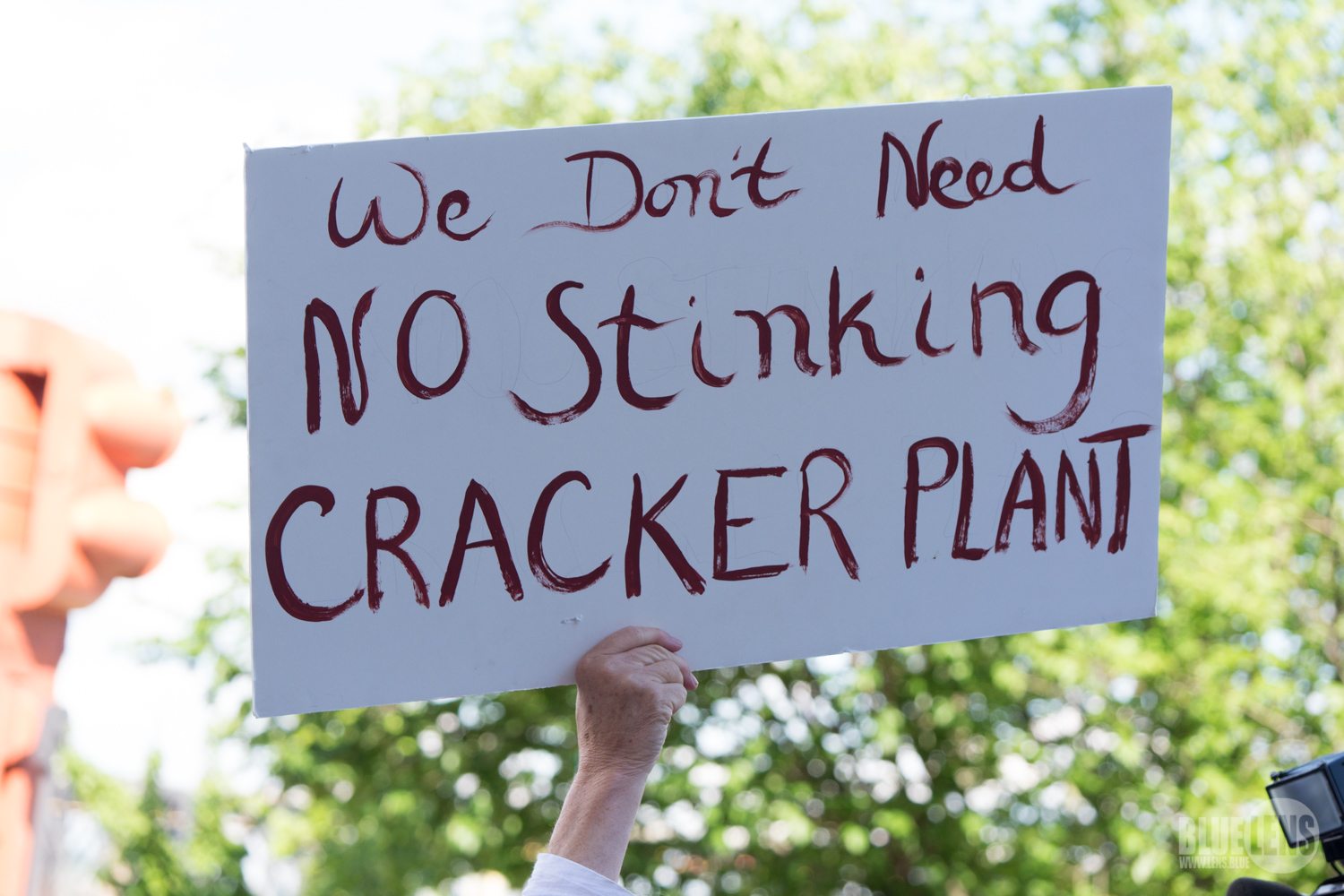
Stop the Madness March. All photos by Mark Dixon.
Mark Dixon is an award-winning filmmaker, photographer, activist, and public speaker exploring the frontiers of social change on a finite planet. He’s also a co-founder of NoPetroPA, a group dedicated to stopping the roll-out of the fracking-based petrochemical industry in Southwestern Pennsylvania. Mark is on the forefront of the resistance against Shell’s Ethane Cracker Petrochemical Facility in Beaver County, PA. A dedicated activist, Mark tells us more about the fight against this plastic production facility in his community.
What is happening in your community?
We’re seeing a doubling down on fracking in our region, not to mention across the state of Pennsylvania and into West Virginia and Ohio. The petrochemical industry is eager to convert ethane into ethylene, which is then converted into polyethylene (a type of plastic). Since the ethane currently extracted doesn’t have an efficient path to market, they are pursuing the creation of at least one and possibly several additional ethane crackers in the PA/OH/WV “tri-state” region, starting with the Shell Cracker. It will take a significant number of additional annual fracking wells to support the ethane requirements of the cracker plant, supporting an ongoing cycle of fracking and cracking. Pipelines are being built to pump the natural gas (methane) around the region, and Shell is gearing up to build the Falcon Pipeline to pump ethane to the Shell Cracker for processing.
This is a major problem contributing to local air and water pollution, climate change emissions, and plastic pollution, exacerbating the global plastic pollution crisis in our oceans. The Shell cracker will generate up to 1.6m tons of plastic per year, much of which finds its way to our oceans. Not only does plastic contribute to physical pollution in the ocean as aquatic life is injured by the ingestion of pieces of plastic that cannot pass through the digestive system, but it also contributes to chemical contamination through an array of hormone disruptors that bioaccumulate up the food chain and eventually find their way into humans. Endocrine disruption is a major issue that we’re only beginning to get our heads around, but can contribute to a wide array of chronic health problems including cancer, reduced fertility, diabetes, obesity, fetal development issues, etc.
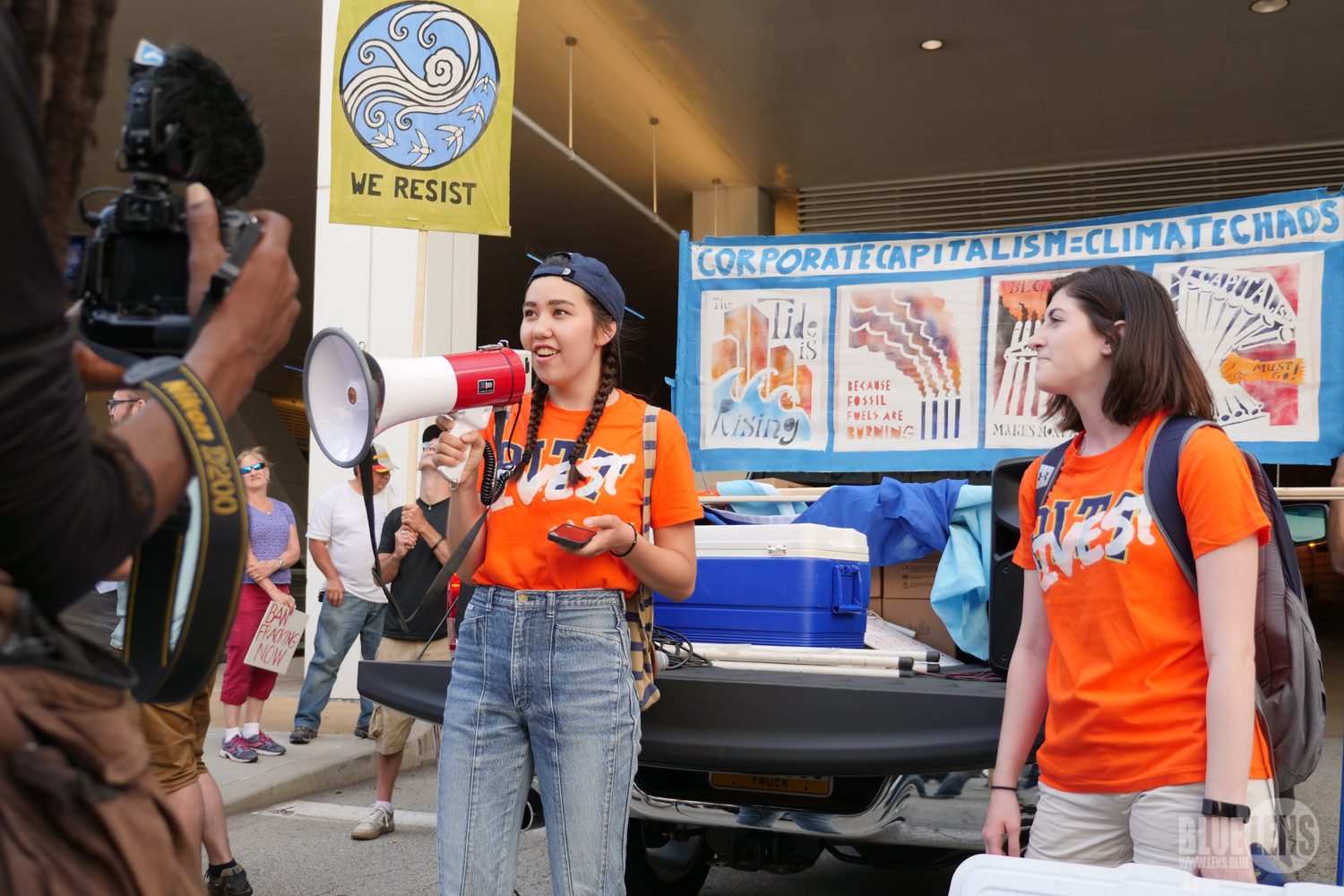
Stop the Madness March. All photos by Mark Dixon.
Why is this a major environmental and social justice problem?
Fracking companies often target poor areas that are hungry for jobs and income to do their business. Shell is no different in its placement of its cracker plant. People who are poor and do not have good job prospects are more likely to be willing to trade the health of their land, air, bodies, and neighbor’s bodies for a job or for a royalty payment. Right away we can see that this creates an economic justice issue, where there is apparently no “fundamental standard” for protection of citizen health. Instead, we collectively protect the health of affluent communities more than poor communities simply by the nature of businesses that those communities are willing to tolerate nearby.
We commonly see that poor people also happen to be racial minorities, extending the injustice to racial domains. There are also injustices in the health impacts felt by different communities. I commonly encounter reports of black and/or female and/or children impacted more severely by exposure to pollution than adult white males. Not only are minority groups more likely to be poor enough to be unwilling or unable to fight against local polluters, they may well also be more impacted by the pollution to which they are exposed.
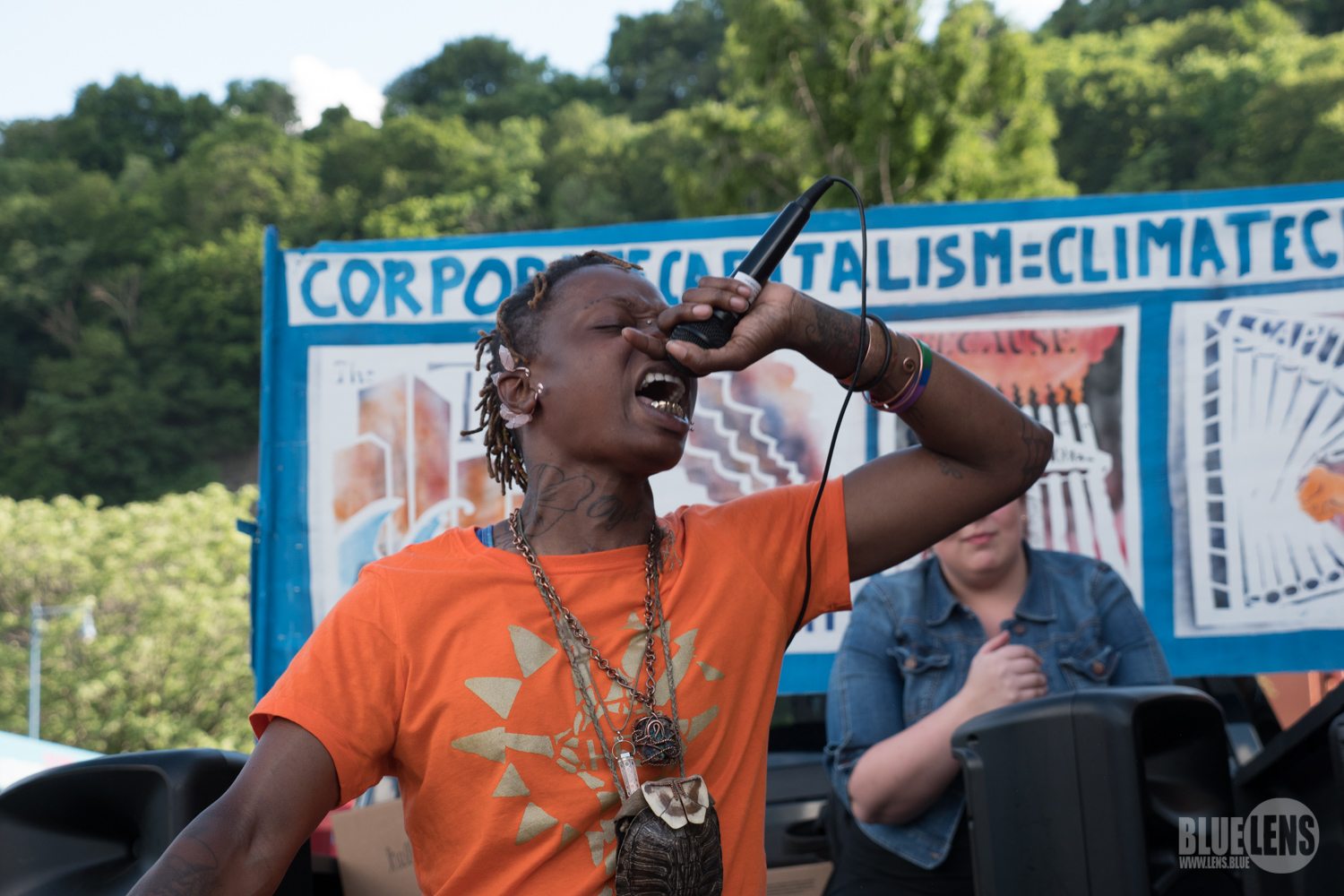
Stop the Madness March. All photos by Mark Dixon.
How have you contributed to efforts resisting petrochemical plants?
I have worked to resist the petrochemical plant in a variety of ways. As a filmmaker, I go to events, hearings, and various locations to film and examine the story around the Shell Cracker and related petrochemical expansion in our region. I have found that videos of citizen testimonials at public hearings tend to be viewed a lot, so I keep filming and releasing those videos. Sometimes I compile quotes from a variety of hearings, or do separate and emotionally charged 1:1 interviews, then thread those together into short videos to share online. My theory of change via videos is that it simultaneously gives people something to do in the moment — in their spare time (call it micro-activism), it allows people to get informed easily and quickly, and it allows people to share the issue quickly and easily with others who may not know. To-date my petrochemical videos have received over 50k views on Facebook and YouTube combined.
I speak out at public hearings. I find that speaking in-person at events allows me to bring both the facts and a personal touch to the issues, pointing people to the environmental and economic problems with the petrochemical build-out, but also enabling me to articulate the emotional necessity for action.
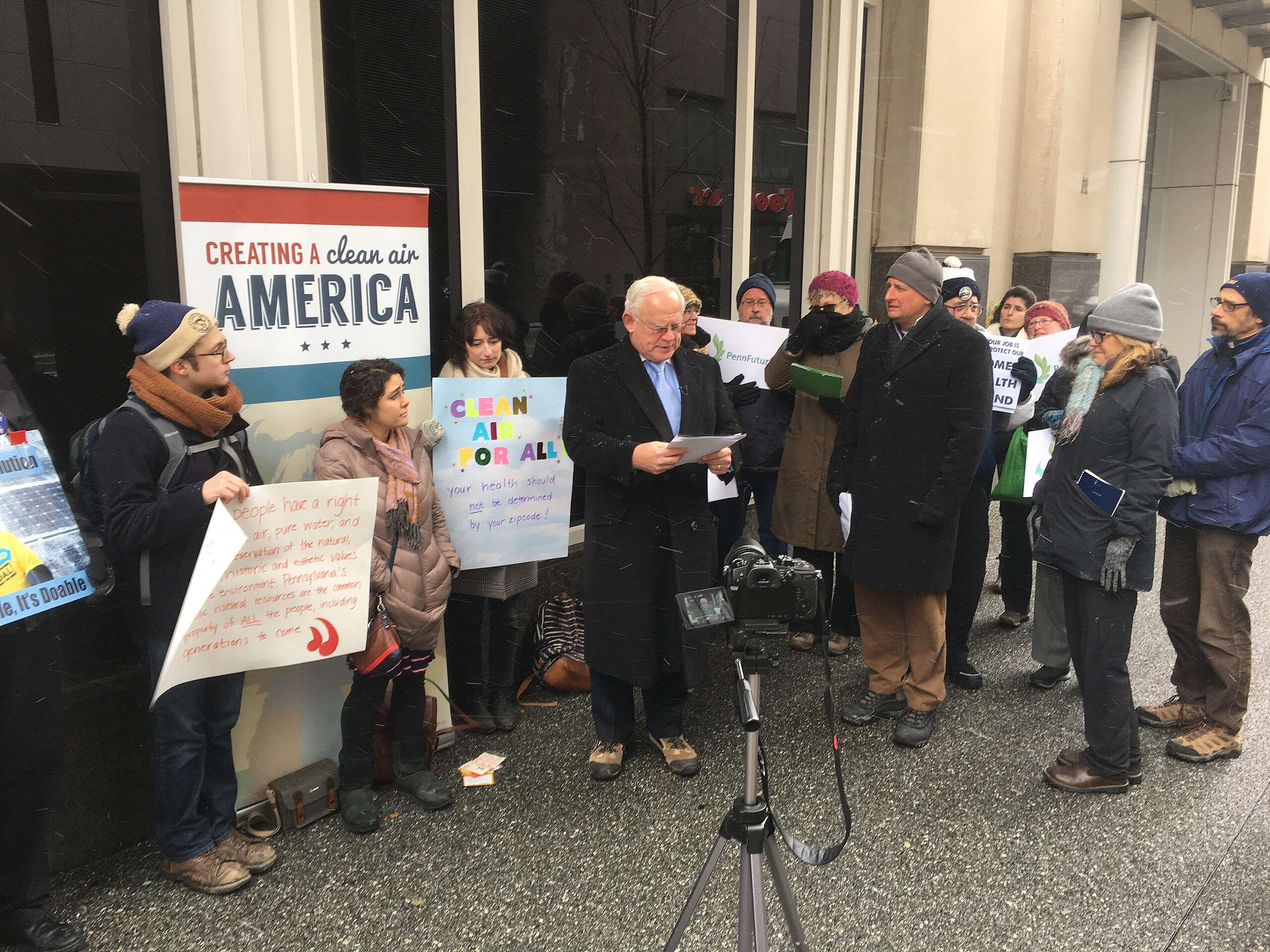
NoPetroPA delivers petitions to Governor Tom Wolf’s office demanding state leaders end Pennsylvania’s petrochemical production. All photos by Mark Dixon.
I have developed the NoPetroPA brand with a few fellow activists and pushed it out into the community via social media, a website with extensive documentation about the problem and also some potential solutions, paper hand-outs, public and presentations at local community groups and universities. A few other groups have picked up the “NoPetro” name and applied it to their own grassroots groups (NoPetroBO and NoPetroOH come to mind). NoPetroPA has taken a sharp and firm anti-Shell cracker view that, at least initially, no major local groups were willing to do. Now other groups are starting to say “no” to the build-out more firmly, but it took many months before we were no longer the only major public voice for a strong “no” to the petro build out in southwestern Pennsylvania.
I collaborate and encourage as many other groups to join the fight as possible working to connect their priorities to what I perceive to be the necessary position to say “no” to this plant (and related build-out) in no uncertain terms. I am working to seed conversations in the local community about what can be done to make this kind of petrochemical expansion unnecessary for jobs or the plastic products that can be expected.
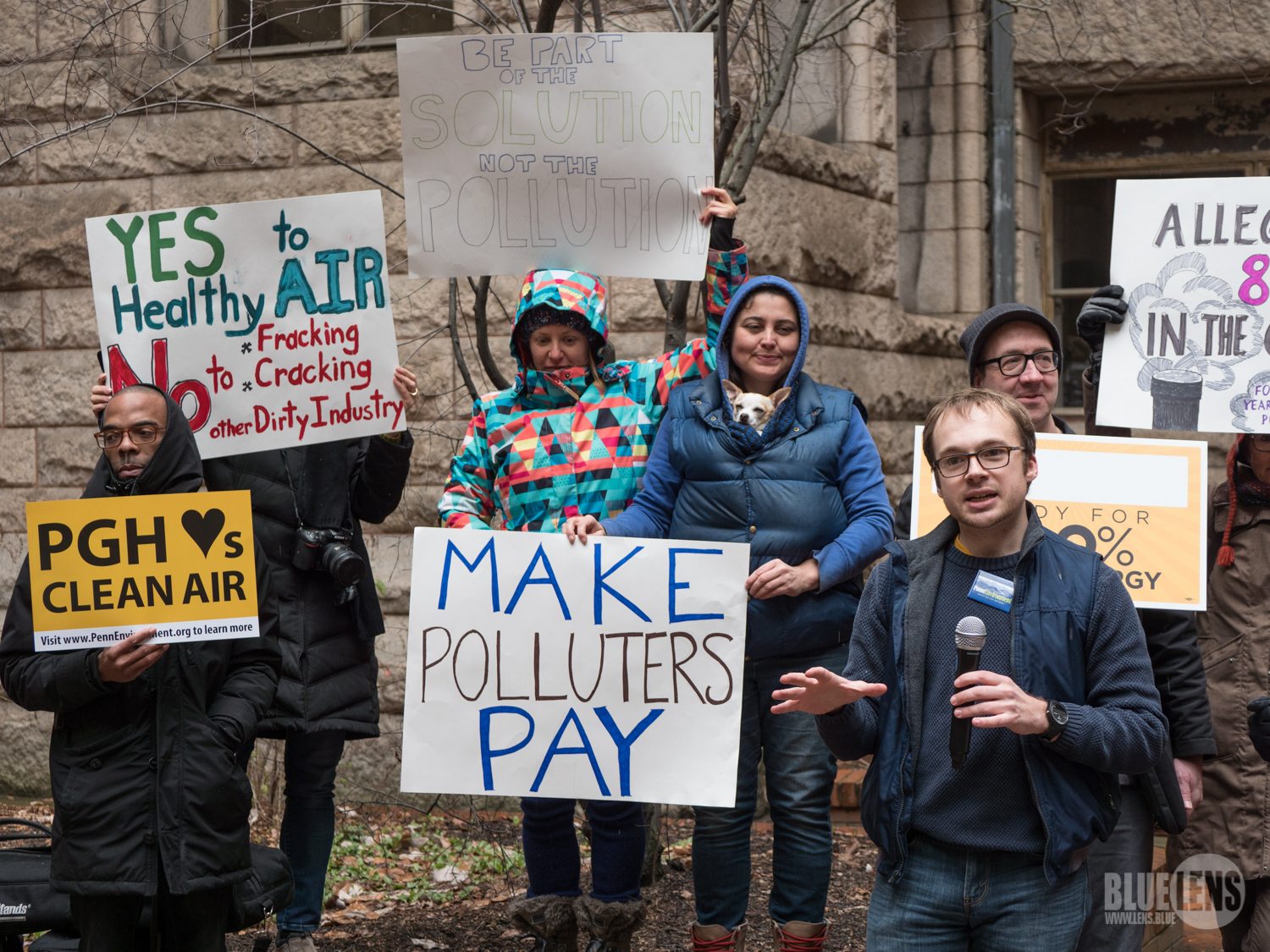
Activists at Pittsburgh’s Clean Air Rally. All photos by Mark Dixon.
Why is this important to you?
This is important to me primarily because of my commitment to fight against climate change. I was trained as Climate Reality Project presenter personally by Al Gore back in 2007, and have been working to creatively counteract climate change ever since, including projects like co-founding the documentary project YERT. The Shell Cracker represents the tip of a massive iceberg offossil-fueled CO2 and methane emissions that the forces of industry seek to roll out and expand for at least another 50 years. We needed to have cut greenhouse gas emissions to virtually zero decades ago, yet we continue to burn fossil fuels as if there were no consequence.
I am flabbergasted by the ability of politicians like Governor Wolf, Senator Casey, and Allegheny County Executive Rich Fitzgerald to simultaneously say they are FOR the Paris Climate Agreement AND ALSO FOR the Shell Ethane Cracker. I say that we cannot have both and anybody that does isn’t paying attention to the basic facts that our global scientific consensus is screaming at us. Pittsburgh already suffered a catastrophic loss of industry when most of the steel mills closed down in the 80’s. We are only now really beginning to bring the city back to the vitality it once had. Will we really go all-in on a petrochemical build-out that requires we ignore the global scientific consensus on climate change for the next 50 years? I expect that there will eventually be enough global political and economic pressure to decarbonize our industrial infrastructure that we will lose trade partners and ultimately be forced to close our petro-dependent plastic and energy infrastructure well before it has lived out its natural economic life. That means that our current massive investment in this direction will become wasted, or “stranded” assets at a time when we really need all hands and all cash on-deck for the expansion of clean energy and green chemistry products around the world.

Mark Dixon. Click here to learn more about his work!
I also live in Pittsburgh, which currently has a ban on fracking. That said, the ban has never been tested in court and if it ever were, we might lose the case. That would open up Pittsburgh to fracking at a time when the fracking industry is moving closer and closer to Pittsburgh’s borders (one well is seeking permits at the Edgar Thomson steel mill in Braddock, just four miles away from my home). Health impacts have been clearly determined at 2 miles from a frack well. I will not tolerate those health impacts at a time when we need to be eliminating all fossil fuel extraction, not expanding it.
This fight came to me and I will stand firm and explore creative pathways for resistance until the day I die. It is inhumane to push fracking onto local communities due to the local pollution. It is unconscionable to push the climate changing impacts of fracking onto future generations virtually in perpetuity. And it is unfathomable that we would risk the health of our oceans to feed a global addiction to plastic when there are other, less harmful and less permanent options available for much of what we currently make from plastic. And then there are the multi-generational effects of hormone disruptors from plastic, but I won’t get into that again.
What motivates you to keep fighting?
People often ask me, “Isn’t the Shell Cracker a done deal?” I must admit that I am not naive and recognize that Shell has all the money and political influence it needs to make this plant happen. To build it, run it, and pollute our local communities and our climate right off a cliff of despair and destruction. I answer the “done deal?” question with this response: “The Shell Cracker is as done a deal as our climate.” In other words, the two are irreconcilably linked. If we give up on fighting the Shell Cracker, which represents so much of what we must NOT have in a climate suitable for human civilization, then we must also give up on climate change. If we are NOT ready to give up on climate change, then we must also never give up on stopping the Shell Cracker.
So is it a done deal? No. I fully expect our tolerance for toxic, atmosphere-heating industries to wane over the next few years. The groundswell of climate common-sense will prevail as climate-changed weather conditions grow more chaotic and the alternatives to fossil fueled petrochemical industries become cheaper and more attractive. This will ultimately lead to the halt of construction of the Shell Cracker OR the premature ceasing of business operations at that plant, well before its anticipated economic lifespan is complete. A multi-billion dollar stranded asset leaving an economic crater in a community that sold away its health and its climate for a few jobs. We will not be Shell’s polluted mining colony. We WILL be contributors of the world we know is possible: a livable climate, non-toxic industries, and a community un-tarnished by the corrupting influences of foreign multinational companies in our political system.
How can readers help you in your efforts?
- Readers can get informed, watch videos, and sign up for e-mail updates at https://nopetropa.wordpress.com/about/
- Readers can join the conversation on Facebook at: https://www.facebook.com/NoPetroPA/
- Readers can seek a federal ban on fracking. We must close the Halliburton loopholes in our regulatory infrastructure.
- Readers can seek a ban on fracking in Pennsylvania. We must push for this at the state and federal level to signal to businesses that this line of work is strategically riskly (i.e. the plug could be pulled on fracking at any moment with the right political momentum).
- Readers can establish zoning ordinances in their local communities that make all fracking prohibitively difficult.
- Readers can refuse to use fracked natural gas or plastic made from fracked natural gas.
- Readers can insist on federal climate legislation and a carbon fee-and-dividend system as advocated for by the Citizens Climate Lobby.
